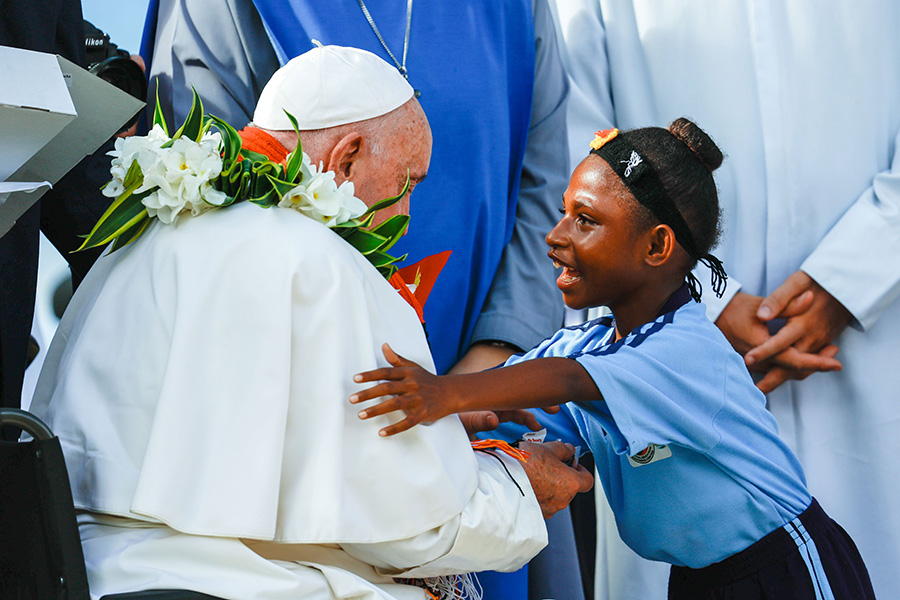
A child hugs Pope Francis during his visit to the Holy Trinity Humanistic School in Baro, Papua New Guinea, Sept. 8, 2024. (CNS photo/Lola Gomez)
Carol Glatz
Catholic News Service
VATICAN CITY — On Pope Francis’ 88th birthday, two major newspapers on both sides of the Atlantic Ocean published two different excerpts from his new book on hope.
The New York Times published the pope’s words on the importance of humor as a “guest essay” in its opinion section, while Italy’s Corriere della Sera ran, as a news story, the pope’s recollection of his March 2021 trip to Iraq, revealing that two suicide bombers had been planning to attack him, but were intercepted and killed by police.
“I was warned as soon as we landed in Baghdad the previous day. The police had alerted the Vatican gendarmes to a report that had come from British intelligence: a woman loaded with explosives — a young suicide bomber — was on her way to Mosul to blow herself up during the papal visit. And a van had also left at full speed with the same intent,” he said in the new book.
“When I asked the gendarmes the following day what was known about the two bombers, the commander replied succinctly, ‘They’re gone.’ The Iraqi police had intercepted them and detonated them. That, too, struck me deeply. This, too, was the poisoned fruit of war,” he wrote.
The excerpts published Dec. 17 were from the book, “Hope: The Autobiography,” written with the journalist Carlo Musso. The book is set for global release in 80 countries Jan. 14.
The New York Times coverage was the second time the paper published Pope Francis’ words as a “guest essay.” In November 2020, it ran “A Crisis Reveals What Is in Our Hearts,” adapted from his then-new book, “Let Us Dream: The Path to a Better Future,” written with Austen Ivereigh.
The Dec. 17 essay, titled, “There Is Faith in Humor,” offered a light-hearted reflection on the need to “avoid wallowing in melancholy at all costs, not to let it embitter the heart.”
“Life inevitably has its sadnesses, which are part of every path of hope and every path toward conversion,” he wrote. But people of faith must avoid the temptation to let sadness turn into bitterness.
“Irony is a medicine, not only to lift and brighten others, but also ourselves, because self-mockery is a powerful instrument in overcoming the temptation toward narcissism,” he wrote in the essay, which was replete with humorous pope-related jokes.
Pope Francis recounts one of them: He is speeding down the streets of New York in a limousine after convincing the driver to let him have a turn at the wheel. When the police pull him over, the officer is shocked and radios his boss about what to do since “I’ve stopped a car for speeding, but there’s a guy in there who’s really important.”
After a lengthy back-and-forth between the boss and officer about who could be that important, the joke ends, “Look, boss, I don’t know exactly who he is, all I can tell you is that it’s the pope who is driving him!”
“The Gospel, which urges us to become like little children for our own salvation, reminds us to regain their ability to smile,” Pope Francis wrote, saying, “nothing cheers me as much as meeting children,” who are “often my mentors.”
He praised the elderly who know how to “bless life, who put aside all resentment” and who have “the gift of laughter and tears, like children.”
Those who find it hard to “cry seriously or to laugh passionately” are on a downhill slide toward becoming “anesthetized” and unable to do anything good for themselves, society or the church, he wrote.
“Those who give up their own humanity give up everything,” he wrote.
The book’s Italian publisher, Mondadori, said Pope Francis began working on the book in 2019 with the understanding it would be published only after his death, but the Holy Year 2025 and its focus on hope led him to permit the early release.
“With a wealth of revelations and unpublished stories, moving and very human, poignant and dramatic, but also capable of real humor, Pope Francis’ memoir starts off in the early years of the 20th century with the story of his Italian roots and his ancestors’ adventure of emigration to Latin America, moving on to his childhood, adolescence, choice of vocation, adult life, covering the whole of his papacy up to the present day,” said a press release from Viking, which will publish “Hope” in the United Kingdom. Random House will publish it in the United States and Penguin Random House Canada will publish it in Canada.
